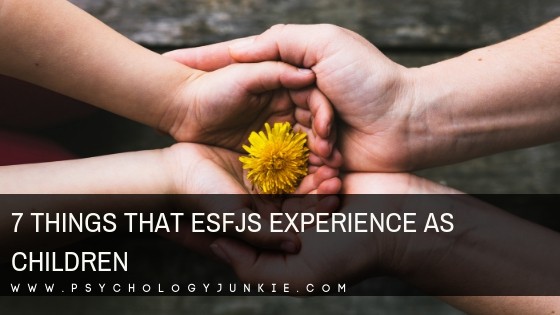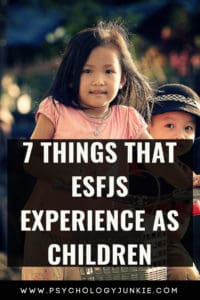7 Things That ESFJs Experience as Children
ESFJs are often called “The Protectors,” “The Caregivers,” and “The Nurturers,” and it’s not hard to see why. Individuals of this type are known for their warmth and genuine interest in the lives and welfare of others. They believe in expressing their values, protecting the less fortunate, and creating a stable, structured life for themselves and their loved ones. Today we’re going to take a look at some of the common experiences ESFJs encounter in childhood.
Not sure what your personality type is? Take our new personality questionnaire!

You can also take our children’s personality questionnaire.
7 Things That ESFJs Experience as Children
#1 – An Intense Desire for Harmony
ESFJs place a very high value on harmony in all of their relationships. They have a natural ability to tune into the emotional atmosphere around them. This makes it easy for them to sense discomfort, anger, happiness, or sadness around them. Aggression, harsh words, yelling, and tension can all create a lot of inner turmoil for the ESFJ child. They may find themselves tailoring their environment so that emotional eruptions are less likely to happen. While this can be a good thing in moderation, parents of ESFJs should be careful to make sure that they aren’t inadvertently forcing their ESFJ child into a situation where they feel responsible for always making sure “everyone is fine.”
#2 – A Need for Structure
ESFJs are the children who flip over all their puzzle pieces and organize them by color before building a puzzle. They like knowing what’s going to happen and what order it’s going to happen in. Having to spontaneously adapt to a sudden, unexpected event can be exhausting to them. They want their parents to be clear with them about the schedule and prepare them for what’s going to happen in advance. At school they want to know exactly what’s expected of them and they want rules to be clear and consistent. Inconsistency, unpredictability, and vague expectations make them stressed and anxious.
#3 – Worry
Very security-conscious, ESFJ children tend to worry about the welfare of their loved ones a great deal. If they read about a home invasion, for example, they might suddenly worry that their house will be broken into. Many ESFJs I’ve spoken to said that as children they checked the locks on their doors before going to bed and were racked with concern when their parents didn’t arrive to pick them up from school on time.
Typologists Paul D. Tieger and Barbara Barron-Tieger say of ESFJs, “They have a tendency to worry about tragic events befalling their parents, even more than children of other types do. When they get into one of these pessimistic moods, their natural sunny disposition is hidden behind the black cloud of their fear of abandonment.”
#4 – Over-Generosity
Because ESFJs are so attuned to the needs of others, and because they so appreciate positive feedback, they tend to go above and beyond to take care of people. They are usually generous not only with their resources, but their time. They enjoy helping people in practical, tangible ways so that life can be easier. This altruism drives them to help those they see as less fortunate. Unfortunately in childhood this can lead to friends taking advantage of them. Some people may demand too much or become manipulative, using emotional game-play to try to coerce the young ESFJ into satisfying them. Parents of ESFJs can help them by role-playing specific scenarios where the ESFJ might be “coerced” and giving the ESFJ words and statements to say to prevent being bullied or taken advantage of.
#5 – A Yearning for Meaningful Connection
Many descriptions of ESFJs give the impression that they are always bubbly and chatty and outgoing. While it’s true that ESFJs are attuned to the people around them, they really do crave something intimate and meaningful. Quantity is far less important to them than quality. They want to be able to pour their authentic self into their friendships and nurture and protect the people who care about them. They are more than willing to stand up against bullies who go after one of their friends and they are deeply loyal to the people they bring into their lives. It is heartbreaking for young ESFJs to experience betrayal because they take the bonds of friendship so seriously.
#6 – A Longing for Tradition
ESFJ children enjoy re-experiencing their favorite moments a great deal. As toddlers this can show up in them repeating the same joke or the same funny scenario so that they can enjoy everyone’s laughter a second time. As ESFJs get a little older they get a tremendous amount of joy from repeated rituals and celebrations. These can be anything from going through an Advent calendar at Christmas or having breakfast at IHOP every morning on their birthday. Meaningful, bond-forging traditions give them something to look forward to and create a sense of stability and comfort in their daily life.
#7 – Inner Perfectionism
ESFJ children are extremely detail-oriented and goal-driven. They tend to enjoy hands-on projects and activities, but they also hold themselves to extremely high standards. They can get so lost in making everything flawless that they stress themselves out in the process. This is particularly true for school projects like dioramas or research papers. They have a very strong “inner critic” that notices every flaw and is inwardly berative at times. This critical voice tends to come out especially strongly when ESFJs are stressed. During moments of stress they may nitpick things they’ve done wrong in their past and feel like they can’t do anything right. Because the voice is often internalized, family members and friends might not realize this is such a problem. Parents can help young ESFJs by modeling contentment and not criticizing themselves in front of their children. They can also help by giving compliments about effort, willpower, and perseverance rather than just the finished product an ESFJ has created. Parents can also remind young ESFJs that nobody is perfect and it’s okay to make mistakes.
Some Articles to Read Next:
10 Things You Should Never Say to an ESFJ
Can Childhood Trauma Impact Your Personality Type?
10 Stress-Busting Tips for ESFJs
What Are Your Thoughts?
Did you enjoy this article? Do you have any thoughts to share? Let us know in the comments!
For those looking to dive deeper, my eCourse, Parenting by Personality, is designed to help you understand your child’s personality type on a whole new level. We’ll explore everything from identifying their type to managing stress, navigating homework, and even handling your own struggles as a parent. This course is packed with tools to support both you and your child through the highs and lows. You can find out more about that eCourse here.
If you’re interested in learning more about all personality types, my eBook, Discovering You: Unlocking the Power of Personality Type, takes an in-depth look at each type’s strengths, how they find flow, reduce stress, and much more. Whether you’re focused on parenting or personal growth, these resources are here to guide you and your family toward a more understanding and fulfilling life.










Hai susan! I have a doubt regarding my type development and I have send it as a message to your instagram profile @susiestorm984.. Please reply!!!
Your analysis are so accurate that I don’t even know what to say about them. I have tears in my eyes reading your articles about ESFJ personality type. I wonder if my personality type can change eventually. It gets tiring sometimes but I can’t help it.